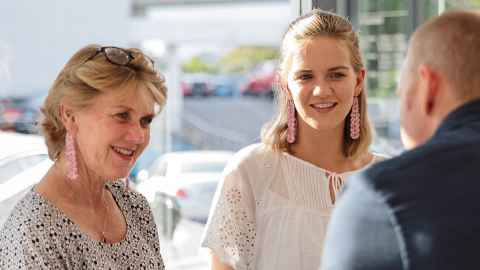Investment in MedTech to translate science to real life
26 October 2021
The Government is investing $8.1 million over three years in Te Tītoki Mataora, the MedTech Research Translator, co-led by the Auckland Bioengineering Institute (ABI) to develop new technologies that could transform healthcare.

The funding has been announced by Associate Minister for Research, Science and Innovation, Dr Ayesha Verrall. “COVID-19 has shown that we need to build a more resilient, productive, innovative and economically sustainable health system, to meet both the demands of a global pandemic, and the demands of a growing and aging population,” Dr Verrall said.
Te Tītoki Mataora is an initiative comprising two linked programmes co-funded by the Ministry of Business and Innovation (MBIE) and the University of Auckland to support collaboration in MedTech-related research and innovation.
It is co-led by the Auckland Bioengineering Institute (ABI), Auckland University of Technology (AUT) and the University of Canterbury (UoC) on behalf of the Consortium for Medical Device Technologies (CMDT), which includes the Universities of Auckland, Canterbury and Otago, Victoria University of Wellington, AUT and Callaghan Innovation.
It harnesses New Zealand's bioengineering and healthcare expertise in the development of new medical tools that will allow for more personalised care, diagnostics and treatment, and often remotely.
This is an area of research in which the ABI is internationally renowned. The programme will also harness the research underpinned by the ABI’s MBIE-funded ‘12 Labours’, a world-leading project that aims to develop a clinically-oriented framework for the mathematical modelling of the physiological systems of the human body, from the ankles to the brain and the organ systems in between.

ABI Director, Professor Peter Hunter, believes this investment will be of considerable benefit to the New Zealand economy.
“It will create a pipeline of new tech companies that can scale significantly and contribute to productivity and exports,” said Professor Hunter. “Here at the ABI, we’ve nurtured a number of successful start-up companies based on the research we do here – such as Alimetry, JunoFem, The Insides Company, HeartLab and Formus Labs.”
“It will also help address inequities in health and wellbeing experienced by Māori, through partnership, co-development of technologies and new opportunities in research, training and business.”
The programme aims to get medical technology research off the bench and into business, said Dr Verrall, by bridging the gap between publicly funded research and commercialisation, and facilitating the development of collaborative projects across New Zealand universities.
“This is an important investment, as it looks to improve capacity and capability, and support the incredible work our researchers and scientists do every day.”
Each project will have a researcher, clinician, and commercialisation expert on the team. The programme will accelerate the most promising projects by providing pre-seed funding to researchers.
National and international connectivity is crucial to translating ground-breaking research into clinical practice, adds Diana Siew, head of Strategic Partnerships, ABI - as is investment in the MedTech sector.
“This funding will allow the University to continue to support the network of researchers in the MedTech sector in New Zealand to maintain the momentum they have been building in recent years."
“It will help us facilitate and build on the crucial collaborations between researchers, companies, government organisations and healthcare providers, relationships upon which innovation depends. This will ultimately enable those innovations to be taken into the real world – creating new businesses and, as a result, improve healthcare for all New Zealanders.”
Media contact
Margo White I Media adviser
DDI 09 923 5504
Mob 021 926 408
Email margo.white@auckland.ac.nz